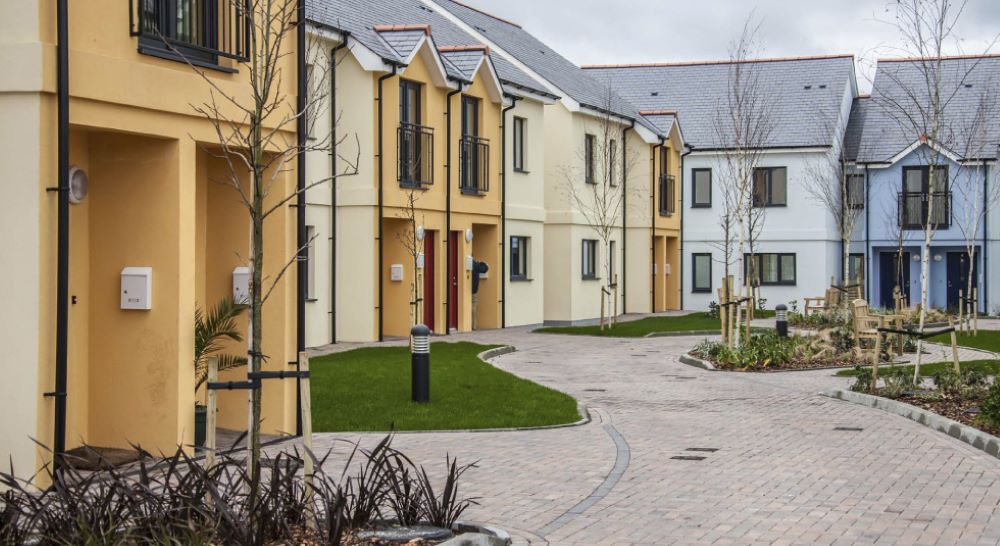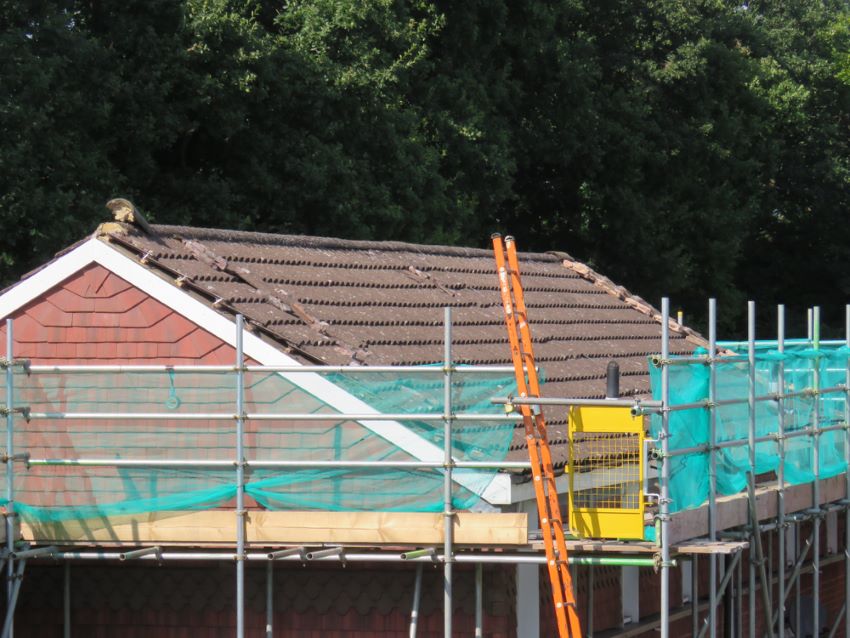


Andrew Le Lievre, one of the island's most experienced voices on social welfare and social housing, shares his thoughts on recent claims of under-investment in States' housing.
I lie in bed with my head in a land of confusion. My work relating to a history of social housing in Guernsey remains untouched lately.
Recent events surrounding the development of the Castel Hospital site have derailed any thought of logical progression through the decades. Whereas my timeline started in 1918 and had progressed as far as the end of the 1950s, I have been dragged kicking and screaming into January 2022. Frankly, I'm not sure I want to be here. The somewhat drab certainty and relative stability of the mid-20th Century have been replaced with uncertainty, clamour, instability and a true fear of what is about to happen next.
I have this vision that the headless chicken has suddenly grown at least three heads which are directly connected to its two pairs of feet. The heads appear to be talking to each other occasionally but unfortunately have little contact with its form of locomotion because it has no coordinated body.
My history of social housing having not yet reached the 21st Century, I don’t want to be too specific regarding how the route of social housing provision has changed, but clearly the introduction of Housing Associations at the turn of the Millennium was a crucial fork in the road.

Pictured: In recent years, the Guernsey Housing Association has replaced the States as the supplier of new or replacement social housing in the island.
The lack of productivity and progress in the previous two decades had most likely triggered this change - along with some disastrous involvements in areas where the knowledge base was minimal to non-existent. But I will have to skip detailed analysis of that period for a bit because I feel compelled to respond to recent discussion about the future of social housing, the role of the Guernsey Housing Association, the financial value of social housing stock and other related matters.
I had been made aware some months ago of a potential mass stock transfer of social housing from the States to the Guernsey Housing Association. Allegedly, there was a first offer from the Guernsey Housing Association of £160million for 1,600 properties. Someone was obviously having fun with me because that price - an average of £100,000 per property - would be more akin to the price of a derelict estate on a sparsely-populated Scottish isle. Such a derisible capital offer also needs to ignore the loss of rental income.
Simple mathematics would appear to indicate that an investment of £160million by the Guernsey Housing Association would bring in £21million a year in rental income – an immediate gross return of some 13.13% per annum for the Guernsey Housing Association as well as the difference between the price paid and the true capital value of our stock. That’s probably a minimum of another £100million in the year of purchase, if not a great deal more.
A good deal for the Guernsey Housing Association – and an appalling loss of capital and revenue for the States when both are in short supply.

Pictured: Steve Williams, Chief Executive of the Guernsey Housing Association.
No doubt the Guernsey Housing Association would argue that the States' housing stock is of poor quality and suffering from lack of maintenance. Its Chief Executive, Steve Williams, said recently that much of the under-investment he claims to see is due to the Housing Authority and its successors having to "beg for it back from the middle".
In what I fear is a bid to work down the final price to be paid by the Guernsey Housing Association, Mr Williams makes the following points:
(a) "A valuation of the properties is currently being carried out along with assessments of how much work is needed to bring them up to better standards";
(b) "With local authorities selling housing stock to housing associations you have to guarantee certain things on rents and repairs as well";
(c) "What the tenants will gain is an acceleration of the modernisation of their homes";
(d) "The States may well have been a bit strapped for cash because all the rent goes to the middle and then they beg for some of it back to repair the properties";
(e) "The States have been on a shoestring for a long time, I would imagine, in terms of looking after their stock";
(f) "The properties are made of varying materials and to varying standards with some dating back to the early 1900s".
You get the idea. His list of negative points goes on and on in this way.
Well, now that every social housing tenant believes they are living in a single-skinned, poorly-maintained, ill-equipped hovel, we should examine the facts and ask whether they support this idea of Housing begging and squirming to obtain something - anything - to maintain or improve its properties.
As soon as the facts are examined, one can see that the negative spin put on these matters by the Guernsey Housing Association is about as far from the truth as one could imagine.

Pictured: Andrew Le Lievre has researched the difference between rents paid for States' houses and investment in their repair and refurbishment.
Careful perusal of the States' Accounts between 1998 and 2013 reveals that:
(a) net rent collected by Housing (after allowing for the Rebate) during the period was just under £102million;
(b) expenditure on repairs, refurbishments and modernisation was nearly £84million;
(c) on average, expenditure on repairs, etc. exceeded £5.6million per annum while the annual average rent collected was £6.8million per annum;
(d) the above equates to Housing spending more than 82% of its net rental income on repairs, refurbishments and modernisations;
(e) expressed as a cost per property for the whole of the property portfolio over 15 years, the expenditure equates to around £42,000 per property;
(f) expenditure on repairs, etc. continues at £6million per annum across all the housing stock.
For the first seven to nine years of the above period, rents were set at an unrealistically low rate. After 2005, rents charged included an element for both minor and major repairs as well as refurbishments (see Billet d’État XX 2004).
Rent Rebates were discontinued in 2018 when the States approved the establishment of Income Support. This scheme ensured that, for the first time since the Rent Rebate scheme was introduced in 1971, Housing received the full gross rent from its properties.
Given the fact that rents were unrealistically low at the start of the period and that for the rest of the 15 years Housing only benefitted from net rents and what might be granted to it in the States' annual Budget, I find it even more surprising that it has performed as well as it has.
And it is not unreasonable to expect expenditure on repairs and refurbishments to increase when Housing benefits from gross rents charged (around £20million) in future years.

Pictured: Andrew Le Lievre is concerned about the value which might be placed on the States' housing stock in any deal to transfer it to the Guernsey Housing Association.
The Guernsey Housing Association might promise to improve the rate of refurbishments when compared with the States' Housing Authority and its successors. But of course it would have the benefits of assured gross income (via the Income Support scheme) with immediate effect – something Housing has enjoyed for only two years in its 100-year history.
No matter how I try, I cannot reconcile the picture painted by Mr Williams with the figures I have extracted from the States' Accounts, which are published each year and approved by the States after scrutiny.
Hopefully, when negotiating the price for our 1,600 or so social housing units, States' senior politicians and officials will have more regard to the States' Accounts and less for striking but dubious claims which are not supported by facts.
While wading through hundreds of pages of the States' Accounts, I came across a reinstatement valuation for our States' housing stock of £511million – yes, just over half a billion pounds. Speaking of it charitably, let's hope there is a little room for negotiation on the starting point of £160million mentioned earlier.

Pictured: Deputy Peter Roffey is President of the Committee for Employment & Social Security, which is responsible for States' housing as the successor to the Housing Department and, before that, the Housing Authority.
I’m told housing associations have a formula for calculating the valuation of housing stock. I bet they do. In the meantime, my mind spins on.
In just two weeks, we have heard from Deputy David Mahoney of the Policy & Resources Committee about his "decent gardens" development for the "not so badly offs". And now we are told by Mr Williams of the Guernsey Housing Association that he wants to buy our social housing stock - and for a bargain basement price, according to my information - because of its poor condition, apparently due to lack of investment, even though the facts do not support this.
Still, I suppose it’s all OK so long as we maintain "action this day".
My mind goes back to 1968 and the building of the Grand Bouet Estate – another example of "action this day".
History, of course, tells us that, while the cost in cash terms was cheap, the cost in human capital over the next 35 years was anything but.
Possibly thousands of lives blighted by being required to live on a soulless estate with no gardens, no privacy, no great expectations and no feeling of being part of island life.
We should all be ashamed if we let a desire for "action this day" override what is sensible and good for all in our community over the next several decades.
Andrew Le Lievre